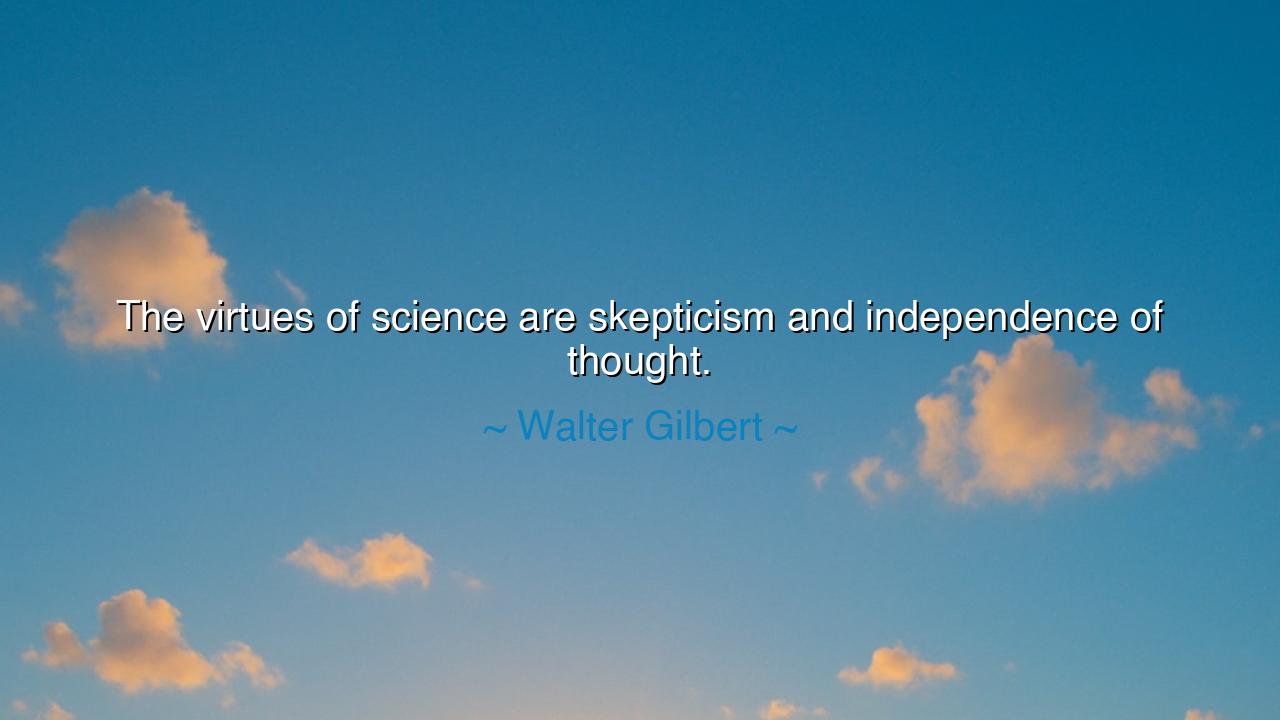
The virtues of science are skepticism and independence of






There are few callings as sacred as the pursuit of truth, and few virtues as essential to that calling as skepticism and independence of thought. When Walter Gilbert, the Nobel Prize–winning scientist, said, “The virtues of science are skepticism and independence of thought,” he spoke not only of laboratories and equations, but of the ancient spirit of inquiry that has guided humankind since the dawn of reason. His words are a reminder that science, at its heart, is not merely the gathering of knowledge — it is a moral discipline, a way of seeing the world that demands courage, humility, and freedom of mind.
To be skeptical is not to deny truth, but to question it until it proves itself worthy. It is the virtue of those who refuse to accept the comfort of belief without the labor of understanding. The ancients knew this well. In the temples of Greece, Socrates wandered the marketplace, asking questions that stripped away illusion and pride. His method was not destruction, but purification — burning falsehood so that truth might shine brighter. So too in modern science, skepticism is the fire that tempers the blade of discovery. Without it, knowledge becomes dogma; with it, knowledge becomes living, breathing, and forever growing.
The second virtue Gilbert names — independence of thought — is the twin flame that guards the soul of science. Independence is not rebellion for its own sake; it is the refusal to let authority dictate truth. Every great advance in human understanding was born from a mind unafraid to walk alone. Galileo, standing before the Inquisition, dared to say that the Earth moved — not because he sought glory, but because he sought truth. His telescope revealed what centuries of doctrine had obscured, and for that he was condemned. Yet time, the great revealer, proved him right. Independence of thought is the courage to stand before power and say, “I see what I see.”
Walter Gilbert, himself a pioneer in the unraveling of the genetic code, understood this deeply. His life was a testament to these virtues. In a world where research can be driven by politics, funding, and fame, he reminded his students and peers that the true scientist must remain loyal to truth alone. To think independently is to listen not to applause, but to evidence; not to dogma, but to reason. The scientist, in this sense, becomes like the monk of the intellect — seeking enlightenment not in silence, but in questioning. For to follow blindly, even the cleverest idea, is to betray the very spirit of science.
Yet these virtues extend far beyond laboratories and universities. Every human being, in their own way, is called to practice skepticism and independent thought. The modern world is flooded with voices — opinions disguised as truth, emotions mistaken for facts. In such a time, to think clearly is an act of courage. To question what you hear, to verify what you believe, and to think for yourself — these are not the habits of arrogance, but of wisdom. For the mind that doubts rightly is not weak; it is disciplined. The heart that thinks freely is not rebellious; it is alive.
History has shown us what happens when these virtues are lost. When skepticism dies, tyranny of thought takes its place. When independence is silenced, truth becomes the servant of power. The dark ages of superstition and censorship were not born of ignorance alone, but of submission — submission to unexamined authority. But when these virtues rise again — as they did in the Age of Enlightenment, as they do in every revolution of mind — the world is reborn. The lamp of science burns brightest when fueled by the oil of doubt and the wick of freedom.
So, my child, remember this: to live wisely is to live like a scientist of the soul. Question boldly, even what you hold dear; think freely, even when the crowd turns against you. Seek truth not for comfort, but for clarity. For as Walter Gilbert teaches, the strength of science — and of all reason — lies not in certainty, but in the unending pursuit of understanding. Let your mind be your compass, your doubt your shield, and your independence your light. For in the union of skepticism and freedom lies not only the power to discover the world — but the power to truly know yourself.






AAdministratorAdministrator
Welcome, honored guests. Please leave a comment, we will respond soon